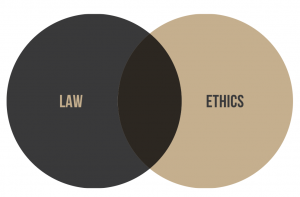Part 1: The Relationship of Legal and Ethical Duties
3 What are examples of when legal and ethical duties overlap?
There is a large area of overlap between law and ethics. That is, in many cases what is legally permissible is ethical and what is legally impermissible is not ethical. Consider an example from several of the major areas of private law. Tort law prohibits many actions that affirmatively cause harm to others, like assault, battery, and false imprisonment. Most people would find that assaulting, battering, or imprisoning others would violate their personal code of ethics. Contract law awards damages in case of breach of many contracts, and many people would similarly find that breaking the promises in a contract without excuse is unethical. Property law protects your ability to keep spaces private and enjoyable by the owner. Similarly, many people would find that trespassing without excuse or bothering one’s neighbors with noise late at night is unethical.

In areas of public law, this may also be true. The United States Constitution guarantees certain freedoms, such as speech and the ability to practice one’s religion, to name just two. Similarly, many people would find that unduly restricting others’ expression or religious practice would be unethical.[1]
The next Question considers the opposite question: when do law and ethics diverge?

Exercises
- For the company in Question 1, discuss briefly how the legal and ethical duties the company faces overlap, if at all.
- That is not to say that these rights are limitless, such as defamatory speech or a religious practice that required commission of crimes! ↵

